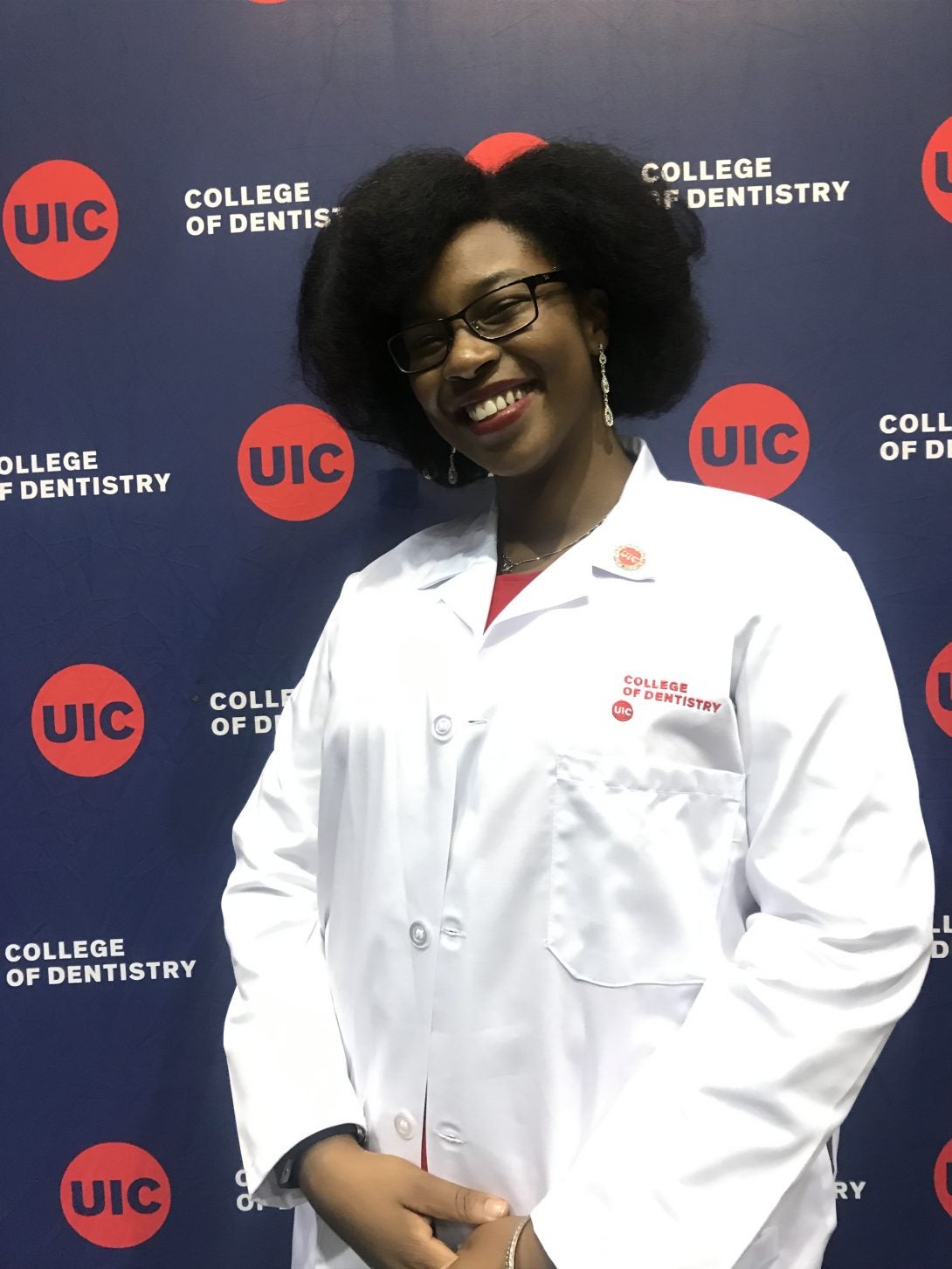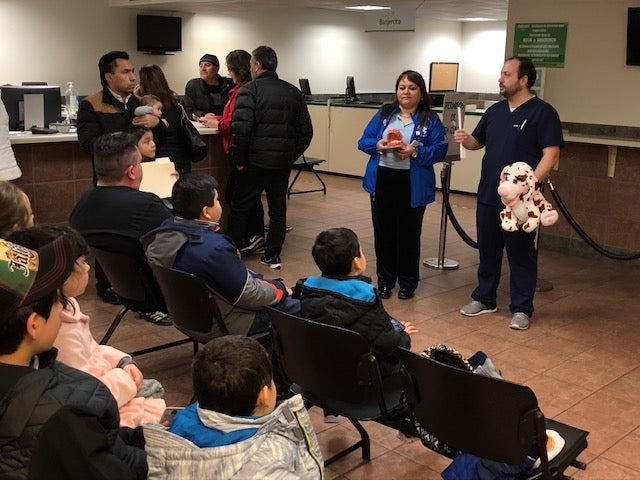Many Paths to Serving the Underserved
Courtnie Akande

Courtnie Akande’s and Erick Raya’s stories prove there are many different paths any person can take to a chosen profession, and to a commitment to serving the underserved. Both pondered in high school what to do with their lives, both chose UIC’s College of Dentistry, both received critical scholarship support and both are dedicated to communities in need. But they’re separated by the many experiences, events and achievements in between.
Courtnie Akande, College of Dentistry, expected graduation 2023
Courtnie Akande grew up in a family that reinforced the importance of academics and hard work. She graduated high school on Chicago’s south side as Salutatorian of her class and was one of two students to earn an International Baccalaureate Diploma for completing a set of advanced curriculum classes and exams.
“While in high school I was weighing what to do with my life and via family friends ended up shadowing a dentist,” says Akande. “I saw my first tooth extraction, fell in love and decided I wanted to do this forever.”
It took many more years for Akande to get to Dentistry. While earning her undergraduate degree in molecular and cellular biology (with chemistry and Spanish minors piled on) she discovered public health and the challenges of equal access, education and preventative care for all people. So her next step fulfilled two goals—living in New York and earning her master’s in public health (the first in her family to achieve a graduate degree). She delved into research as well, participating in a study with NYU Langone Medical Center working with dental offices on tobacco cessation.
Upon her return to Chicago she began work on a University of Chicago clinical research project that required a team member with a love of dentistry. For three years she spoke to patients about oral healthcare and observed the obstacles many individuals face in seeking care. After this, finally, Akande was ready for dental school. UIC’s College of Dentistry proved the right fit being not only close to family, but also part of a significant health system serving many marginalized patients.
“I’ve heard so many heartbreaking stories from individuals on the South Side who don’t know where to go for care; who don’t know who to rely on,” says Akande. “My public health degree allowed me to talk to these folks and see the gaps the system creates. It motivates me to do this work, give back to Black communities and help those who don’t know where to begin to navigate the system and stay healthy.”
In 2019, Akande was awarded the Bruce S. and Linda M. Graham Scholarship, which was established to support first-year dentistry students who demonstrate academic merit, financial need and a commitment to serving African American communities.
“This support was a blessing when I really, really needed it,” says Akande. “Family health issues led to financial burdens, and this gift gave me wiggle room. And it was encouraging for a non-traditional student and person of color. I felt seen and rewarded for my hard work and that I was given a chance to succeed.”
Often dentists don’t set up shop where the need is greatest and it creates disconnects for communities. But Akande is focusing on where the need is instead of just on what she wants to do. So she plans to spend her post-graduation years at FQHC’s or in hospitals before she settles down to open her own practice.
“Social justice means everyone taking a look at everyone else with equal respect and seeing equal value,” she says. “I will meet any member of a marginalized south side community where he or she is and provide affordable care. This is how I’ll create equity, by caring for those who have been ignored.”
Erick Raya

Erick Quintana Raya, DMD ‘20
Erick Quintana Raya didn’t have dental care when growing up in Mexico, and didn’t know any dentists in his area. He moved to Illinois at 17, alone, without his support system and safety net. When exploring different careers in high school dentistry intrigued him, although that schooling would cost him hundreds of thousands of dollars. He pursued it regardless.
His trajectory began as a dental assistant, then on to community college courses, then volunteering in dental clinics and shadowing dentists while earning his bachelor’s degree. The experiences felt natural and solidified for him that this work was right for him. His volunteer work also showed him access to care issues.
“I was exposed to segments of the population that were seeing the dentist for tooth pain, not preventative care,” says Raya. “It showed me dentistry is not just making nice smiles for people. It also involves some elements of social justice.”
Of the five dental schools Raya applied to, UIC was a top choice, but an intimidating one. Relocating from the rural Illinois town where he’d settled to Chicago would be expensive. But a scholarship through the Urban Health Program sealed the decision for him. The program conducts outreach to those with a low socioeconomic status and offers pipelines into health programs, ensuring those with interest but little means can be competitive applicants. They even helped him with basic science classes to refresh his skills.
Raya received the Dr. Caswell A. Evans Dental Public Health Scholarship Award for students who have a unique concern for the oral health of underserved populations and who have been actively involved in addressing the inequities those populations face. He was also named an Achievement, Commitment, and Empowerment student scholar for demonstrating financial need, leadership and serving the underserved.
“The scholarships are a sign what I’m doing is right and worthwhile, and reassures me this is important,”
said Erick. “The money is a great, great help and I’m proud to be recognized for addressing access to care in dentistry, which few people recognize.”
His first volunteer experience was at a county health department with limited resources, and since then Erick has volunteered in some capacity. At UIC’s College of Dentistry he was interested in educating communities about oral health so they can take ownership of their own well-being.
Looking ahead, Raya wants to find a way to balance the artistic part of dentistry—making pretty smiles—with serving the needs of marginalized communities. Today he’s in a hospital-based residency where he sees those with compromised health, kids with behavior issues and special-needs patients. He’s improving his skills and ability to make appropriate referrals.
“I am more than an individual; if my community is healthy, then I’m healthy,” says Raya. “You can put a dental clinic in a neighborhood but it won’t help much. If you work with residents to see their perspectives, learn their needs and teach them how to seek services, the community will start to take care of itself.”